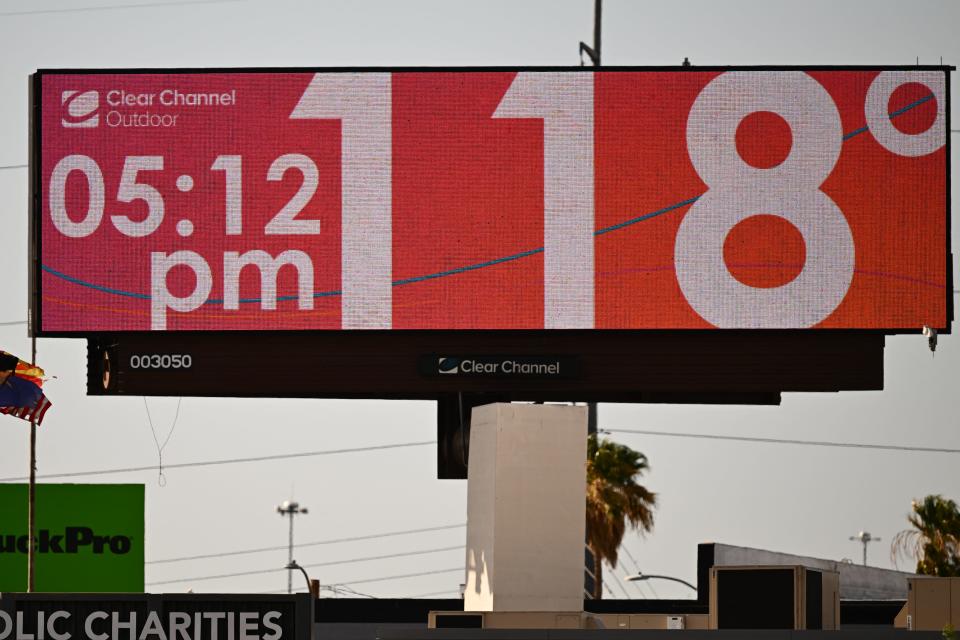What if Phoenix suffered an extended blackout in a heat wave like this one?
A heat wave that spans the globe and concentrates hellfire on the American Southwest is generating a lot of fascinating stories.
So, let’s begin with a few tributes.
First the Latin American men in Phoenix who are landscaping and mowing yards in this 110-degree plus heat.
They are men’s men — the toughest among us, working through this heat wave in even the hottest hours cutting grass and trimming trees.
That itself is impressive, but they don’t flinch. They don’t agonize.
Think of the tough guys working in heat
They move quickly and methodically through these record-setting high temperatures as if nothing has changed, as if to laugh at all the city-slickers who gripe about the heat wave from inside their air-conditioned homes, offices and cars.
Heat wave? What heat wave?
They’re covered head to toe against the sun and top it off with wide-brimmed straw hats you see in the Yuma lettuce fields and a pair of cool shades.
They are the coolest men on Earth in one of the hottest times in history.
They are sun gods.
Don't forget to thank the power people

Let us also pay tribute to the utilities. SRP and APS, who have come in for a lot of criticism over the years.
When we most need them, when we are consuming more electricity at once than we ever have before, they keep us cool against the beating sun.
That matters more than you know, as my next item will show, because there are lot of elderly people and small children who would be in serious straits today if the utilities couldn’t keep up.
Despite a few relatively short-lived power outages in Mesa and Chandler, thousands of air conditioners have hummed continuously through the 20-plus days of high heat.
That’s not by accident.
A/C in metro Phoenix hasn't flinched
Lots of planning went into making sure Phoenicians could get through these miserable days with reliable power supplies.
“We’re using all the tools in our toolbox — from solar power to natural gas — to make sure customers can count on us for electricity every second of the day,” APS Vice President of Resource Management Justin Joiner told the City Sun Times. “Our power plants are running smoothly, and the energy supply is robust. That’s what proactive, year-round planning looks like.”
We’ll forgive him that moment of well-earned self-promotion.
APS has taken a lot of hits over the years. These high temps have me remembering back to something Jay Heiler, the former aide to Gov. Fife Symington and now policy adviser, once said about the utilities when they were under political attack.
Record temps: Prompt Arizona to start inspecting workplaces
“You know, these are pretty important companies.”
Damn straight.
What happened if the power went off?
Phoenicians will appreciate their local utilities when they read about the academic study the Los Angeles Times referred to on Wednesday.
What would happen if the city of Phoenix suffered an extended power blackout during a five-day heat wave — just one-fourth the length of our current event?
A study recently published in Environmental Science & Technology, a peer-reviewed scientific journal published by the American Chemical Society, found that the death rate in Phoenix would rise over 700% if the power remained off for several days in the heat, amounting to some 13,250 deaths and approaching 1% of the population.
But that isn’t the eye-popping number.
Most of us would be hospitalized
More than half of the city’s residents would require hospitalization, according to the study. You read that right.
Half.
Or roughly 816,570 people would require “emergency department visits.” The city of Phoenix population is roughly 1.6 million.
The study also projected out what a similar heat-wave blackout would do to Phoenix in late century, given the rising temperatures provoked by climate change.
The number of Phoenicians requiring emergency medical services in such an event would rise to 68% of the Phoenix population.
Obviously, you don’t hospitalize 68% or even half the Phoenix population. No city on Earth has that kind of hospital capacity.
Instead, you make sure well in advance you have the power supply and infrastructure you’ll need.
And you pay tribute and honor to the sun gods.
Phil Boas is an editorial columnist with The Arizona Republic. Email him at phil.boas@arizonarepublic.com.
This article originally appeared on Arizona Republic: Phoenix heat wave would kill many of us if we didn't have this
